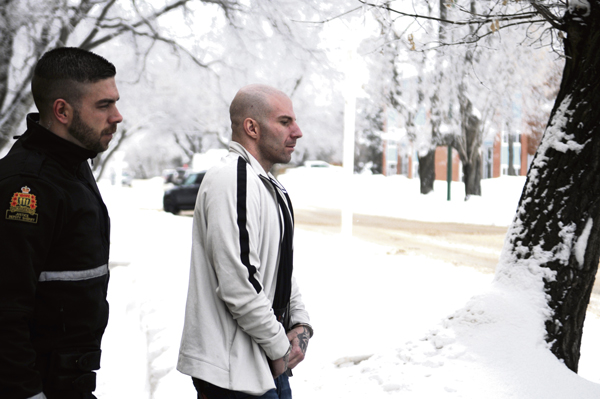
Vandewater, fellow inmate testify about Van Camp’s death, gang culture in week two of murder trial
Warning: graphic content and foul language
The man accused of killing his cellmate during a 2017 altercation in a maximum-security Saskatchewan Penitentiary (Sask. Pen) cell told the court during cross examination Monday that it was a matter of kill or be killed.
Tyler Vandewater has pleaded not guilty to murder in the death of his cell mate, Christopher Van Camp, in June 2017. Van Camp’s death occurred just hours after he was returned to the jail following a drug overdose.
The pair were living in the Sask. Pen’s C-Range, which Vandewater claimed houses mostly members of the Terror Squad gang and associates. On Monday, he said he’s labelled as an associate.
Vandewater took the witness stand on Friday. His testimony continued under fire from Crown Prosecutor Linh Lê on Monday.
“That could have been me,” he said.
“It’s hard to explain to someone who’s never been in a life or death situation like that,” he told Lê when she asked how many times he stabbed Van Camp. Vandewater couldn’t give an answer.
“You’re kind of in tunnel vision,” he said. “My adrenaline was going.”
Last week, forensic pathologist Shaun Ladham testified that Van Camp had 26 wounds on his face, which trailed down his neck to four punctures on his chest. Three of those wounds went into his lungs, with two puncturing the heart. He also had 25 stab wounds along his upper back.

“I couldn’t believe that’s how many times he got hit,” said Vandewater, who had no injuries other than light scratches on his side.
He testified that Van Camp was pacing in their cell with his weapon, and Vandewater told him to “chill out.”
Vandewater said Van Camp told him “I’ll fucking kill you.” Vandewater said he feels he meant it because he was lunging at him with the homemade shank.
At one point, Vandewater testified, he was on top of Van Camp, who was trying to “buck” him off. He said he wasn’t going to let him get up.
“All it takes is one shot,” he said. “What are you supposed to do? Sit there and get killed?”
“I want to come home to see my family one day.”
When Lê asked Vandewater if he cared about Van Camp, he said “I still do to this day.”
“The aftermath of what happened kills me because he was my family and I loved him.”
Vandewater said he didn’t want to tell anyone, especially the guards, about Van Camp’s death because he couldn’t be considered a “snitch.” The term would hang over him for the rest of his time in prison, he said, and he would be in danger of getting stabbed everywhere he goes.
Vandewater told court about the G-Code—the gangster code—which says no one gives any information to the guards.
However, he said because Van Camp is deceased, he’s not vulnerable to being charged for allegedly attacking Vandewater. He said he was given permission by another inmate, who they call Slim, to tell court what happened.
Darren Nilsson was the range representative at the time of Van Camp’s death.
He sat at the witness stand with his black hair tucked behind his ears, his neck covered in tattoos. Vandewater sat in the prisoner’s box looking straight forward.
When Van Camp came back to the Sask. Pen, said Nilsson, he wasn’t acting like himself.
“He automatically started asking questions, like ‘Who’s plotting?’” he said. Nilsson said he tried reassuring Van Camp that no one was out to get him.
“I thought he was high when he first came in.”
When the fight occurred, Nilsson said he only heard “scuffling, yelling back and forth.” He said he didn’t intervene because it was “Not my business. It’s not my cell.”
When Nilsson heard the next morning that Van Camp had died, it was “a rude awakening.”
Vandewater described the Terror Squad gang as a group of brothers who have each other’s backs. He said there is a ranking system, with Nilsson giving the orders because he’s the most respected.
But Nilsson didn’t appear to agree, saying naturally the newer members tend to follow behind, but there’s no ranking.
He said he’s recently disassociated from the gang.
Nilsson didn’t consider the C-Range the Terror Squad Range, and that it was simply for general population.
He said ‘the minute’—which Vandewater considered a discipline—was more of a “show of strength.”
The minute, as Vandewater explained, is when two or three people beat someone for sixty seconds without weapons, and the person getting the minute is allowed to fight back.
When Lê asked Nilsson if he felt there was a reason for someone in Vandewater’s situation to be afraid of the other inmates, he was silent for a few seconds.
“I don’t know, maybe,” he said. “If they feel scared, that’s on them.”
“It’s not built like ‘Oh, you disrespected TS (Terror Squad), now I’m going to get you.”
Van Camp’s mother, Lauren Lathwaite, is attending the entire trial.
Outside of the Court of Queen’s Bench on Monday, she said she holds responsibility for her son’s death not only on Vandewater, but also the attorney general and Correctional Service of Canada (CSC).

Van Camp was previously in minimum and medium-security units, she said.
“The reason why they moved him up was because of his drug use in jail. This was how they babysat him. He wasn’t violent in jail, he wasn’t hurting people or beating them up. They can’t keep the drugs out,” she said.
“I’ll tell you what I do see. Everything that (Vandewater) said Christopher was is a projection of what he is. If you know anything about projection, angry people always think other people are angry—who’s the paranoid one here? We see Tyler as being the paranoid one. We see him being afraid of what people are going to do.”
Laithwaite said she believes Vandewater was “legitimately honest” about the pecking order within the range. However, she thinks both witnesses are not credible.
The trial continues on Wednesday with closing arguments.

